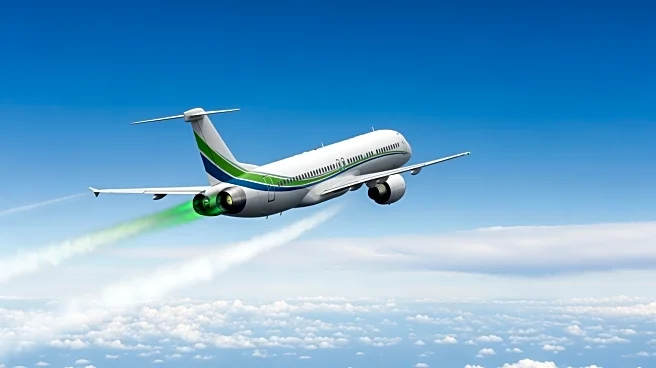What's Happening?
Gulfstream Aerospace has announced that its fleet has flown over 3 million nautical miles using Sustainable Aviation Fuel (SAF). This milestone reflects the company's commitment to reducing its carbon footprint and promoting environmental sustainability
within the aviation industry. The use of SAF at Gulfstream's headquarters in Savannah, Georgia, is projected to increase by 50% this year, further underscoring the company's dedication to sustainable practices. SAF is a cleaner alternative to traditional jet fuel, offering significant reductions in carbon emissions. Gulfstream's initiative aligns with broader industry efforts to adopt greener technologies and fuels to mitigate the environmental impact of aviation.
Why It's Important?
The expansion of SAF usage by Gulfstream is significant for the aviation industry, which is under increasing pressure to address environmental concerns. By adopting SAF, Gulfstream is setting a precedent for other companies in the sector to follow suit, potentially leading to widespread adoption of sustainable fuels. This move not only helps in reducing greenhouse gas emissions but also supports the industry's long-term sustainability goals. As aviation contributes a substantial portion of global carbon emissions, initiatives like Gulfstream's are crucial in driving change and fostering innovation in fuel technology. Stakeholders, including environmental groups and regulatory bodies, are likely to view this development positively, as it aligns with global efforts to combat climate change.
What's Next?
Gulfstream's commitment to increasing SAF usage is expected to influence other aviation companies to explore similar sustainable practices. As the industry moves towards greener alternatives, there may be increased investment in SAF production and infrastructure to support its widespread use. Regulatory bodies might also consider implementing policies that encourage or mandate the use of sustainable fuels. Additionally, Gulfstream's actions could lead to collaborations with other industry players to further research and development in SAF technologies, potentially accelerating the transition to more sustainable aviation practices.
Beyond the Headlines
The shift towards SAF not only impacts environmental sustainability but also has economic implications. As demand for SAF grows, it could stimulate job creation in the renewable energy sector and drive technological advancements. Moreover, Gulfstream's leadership in this area may enhance its brand reputation, attracting environmentally conscious customers and investors. The ethical dimension of reducing aviation's carbon footprint also plays a role, as companies are increasingly held accountable for their environmental impact by consumers and advocacy groups.
















